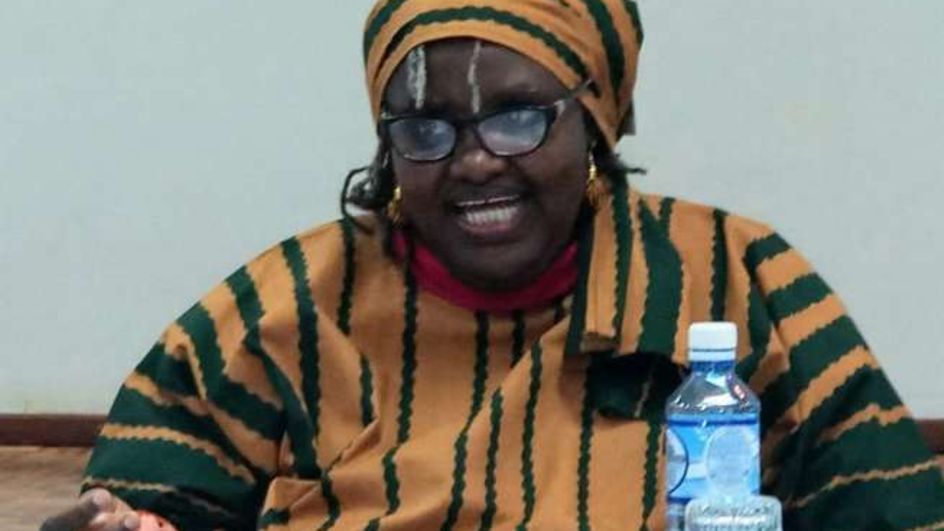
Ebrahim Hussein, the eminent Tanzanian dramatist, was my undergraduate contemporary at the universities of Dar es Salaam and Madagascar. In “Kinjeketile”, his dramatisation of the epic anti-colonial Majimaji struggle, Hussein has his tragic hero reflect on the power of the word.
A person conceives a word, reflects Kinjeketile towards the end of his life, and the word dominates and controls that person, through thick and thin.
Last week, I promised that I would tell you about my dear departed sisters and colleagues, Lillian Kaviti and Wanjiku Matenjwa. So I have to keep my word, although many others have written and spoken and written about these remarkable women.
Even I have written variously about Wanjiku in these columns, as some of you, faithful followers, have reminded me.
But there is an angle to my chatter. I have a particular weakness for the names of the daughters of Mumbi and Gikuyu, and their cognates, and I am fascinated with the way they roll off the tongue. Wambui, Wanjiku, Wangari, Wangui and all that is “wa-“ arouse me!
CONFESSIONAL TRADITION
That is why I keep thumbing through Ngugi wa Thiong’o’s Kenda Muiyuru (Perfect Nine), though I make very little of it in the absence of my Nairobi interpreters.
A further complication is that the many years I gallivanted around Nairobi and the rest of Central Kenya put for me real life people, many of them close and intimate friends, behind most of these names. Indeed, the joke among my acquaintances, if I casually mention a name like “Wanjiku”, would be, “Which Wanjiku?”
I loved a compliment that one of you, my readers, recently paid me. She said that she likes the way I “wear my heart on my sleeve” and tell my story the way I lived it, absurdities, heartbreaks and all. That may have something to do with the “confessional” tradition in which I was raised.
Realistically, however, I see no alternative to making our sharing meaningful and worthwhile. I now know that I am just a silly old person, lucky enough to have a wagging tongue. The best way to wag it is in the truthful narration of what I have actually lived.
LIFE STORY
Back to my recently departed colleagues. UoN’s Lillian Katunge Kaviti, who preceded Wanjiku Matenjwa into ancestor land by a few days, was not a close acquaintance of mine. But I knew her as a prominent language scholar, and I deeply respected her lucid and articulate writings in applied linguistics.
I regarded her as an excellent representative of the fourth generation of East African linguists, and I could not help sharing with our colleagues in the trade the sadness of losing her in what was apparently her academic and scholarly prime.
As for Wanjiku Matenjwa, I shall only mention a few memories in her story that I might not have previously shared with you.
I told you of the circumstances that led to her and her colleagues’ being relocated from Makerere, where she had been my student, to UoN, where she studied under Ngugi wa Thiong’o, Micere Mugo and their colleagues.
Did you know, however, that there was, sadly, a Mrs Bukenya in that part of her story? Mrs Theresa Nanziri Mukasa-Bukenya, a brilliant Mathematics don, was the warden of Africa Hall, the women’s university hostel, where Esther Chesire and several of her Kenyan student comrades resided.
BRUTAL KILLING
Ms Mukasa-Bukenya was summoned to testify before a commission of inquiry demanded by Kenya following the abduction and “disappearance” of Esther Chesire at the hands of Amin’s men.
The day after she testified, Ms Mukasa-Bukenya was abducted from her office at Africa Hall. Her body was found three days later, dumped in a marsh about 60 miles away from Kampala, shot through the head, with her hands tied behind her back. She had been six or seven months expectant with her first child.
She had been married for about a year to my lineage relative and performing arts colleague, musician Achilles Mukasa-Bukenya, who eventually fled to Kenya, where he taught music for several years at Saint Mary’s School.
I never got to discuss this gruesome story with Wanjiku Matenjwa, but it goes to show that she and her colleagues who had to leave Uganda at that time were very traumatised people.
It took the toughness and resilience that I always admired in Wanjiku Matenjwa to adapt to their new life and study style in Nairobi.
PERSONAL TRIALS
Wanjiku performed so brilliantly that she earned herself an academic appointment at the then Kenyatta University College almost immediately on graduation.
But even at KU, where she was my colleague, Wanjiku faced many personal trials, including a spell of poor health which nearly put paid to her academic career.
Even more impressively, though unbeknownst to me at the time, but maybe due to the mentoring of stalwarts like Ngugi wa Thiong’o, Micere Mugo and Wangari Maathai, Wanjiku Matenjwa had become politically active in the transformational struggle that eventually led to the pluralism now enshrined in — you guessed it, “Wanjiku’s Constitution”.
A mutual friend of ours, Ms Lydia Gaitirira, reminded me that when our colleagues, like Maina Kinyatti, were being handed prison terms, Wanjiku Matenjwa was the leader of the group of young women who staged protest dances at the Nairobi Law Courts, at great peril to themselves.
Wanjiku Matenjwa was a lifelong activist, especially for the rights of women and the youth, even as she pursued her academic career, eventually earning a doctorate.
I finally caught up with her through the young writers’ mentoring activities of AMKA (ARISE), an empowerment NGO she co-founded with like-minded activists back in the 1990s.
Makerere might have contributed to her literary career, but UoN made her the woman of action and vision for which she should be best remembered. Incidentally, I would be grateful to hear from any of Wanjiku’s comrades who relocated with her from Makerere.
